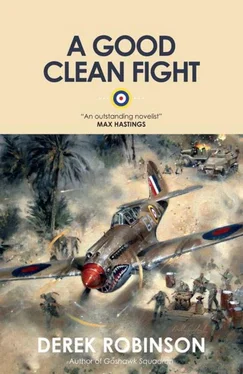“Maybe. I can try. What’s the tearing hurry?”
“Corky, if we want the aircrew, that means they’re important, so you can bet the Luftwaffe wants them too.”
“Yes.” Gibbon scratched his beard with his usual ferocity. “You’ve just had two rough nights, and a bloody rough day too, by the look of it. You sure you’re up to this?”
“No.” Lampard stood, but his head was twitching and one hand was trembling. Gibbon had never seen that before. “I didn’t expect it would be like this, Corky,” he said. “I thought I’d get killed first. This isn’t how I expected it at all.” Gibbon shrugged.
The trucks were already loaded. Lampard got into the back of the one where Menzies was lying. Smedley got into the other. Sandiman sat next to him. “What went wrong?” he asked quietly.
“Not for me to say, sir,” Smedley said.
The trucks moved off.
* * *
The pilot had not been joking when he said the crusts had been cut off the sandwiches. There was ham, cheese, or egg mayonnaise; also an apple each; and iced coffee. The atmosphere in the cockpit was one of well-earned celebration.
“When did you learn to be a bomb-aimer?” Schramm asked.
“Yesterday,” di Marco said. “If General Schaefer said yes, I wanted to be ready.”
“Very professional.”
“When you can fly low, and there is no wind and no flak, it is not difficult.”
“What about me?” the pilot said.
“You were very professional too,” Schramm said.
“I was, wasn’t I? We didn’t collide with anything, not even those enormous mountains. That’s the first thing they tell you at flying school: don’t collide with the mountains.”
“Watch out,” Schramm said. “Here they come again.”
In fact the Tibesti range was still more than two hours away. When it came in view the pilot said he needed another break, and Schramm took over the controls. The peaks looked even more magnificent as they slid past the left wing.
“Good climbing in those mountains,” di Marco said. “Many gazelle.” During the next hour he gave Schramm several slight changes of course, always nudging the Heinkel toward the northwest. “Headwind,” he said. “It keeps pushing us eastward.”
“Bad for fuel consumption.”
“Not good. But the machine has lost much weight.”
“Good for fuel consumption.”
“Not bad.”
The fuel gauges told their own story, and long before the pilot squeezed his shoulder and Schramm slid out of his seat, he knew the bomber would never make Defa. He plugged in his intercom just in time to hear the pilot say, “How long have we got?”
“Fifteen minutes,” di Marco said. “Twenty at most.”
“As soon as I find a promising bit of desert I’ll go up and circle,” the pilot said. “You’ll need some height to help the signal on its way.”
The rest was routine. The Heinkel climbed and circled, and then spiraled down to the desert floor, which turned out to be flat and smooth. They landed without a bounce and rolled to a stop.
“That’s the easy bit,” the pilot said.
They got out and walked about. Simple exercise was a huge pleasure. There were some high dunes in the far distance to the west; otherwise the Sahara reached emptily to all the horizons. After a day of constant engine-roar, Schramm found himself listening for a sound, any sound. His ears craved noise. The silence was so greedy that it was painful. When he spoke his voice seemed puny. “What next, d’you think?” he asked di Marco.
“Our Desert Rescue Unit should come out and get us.”
“Aircraft?”
“Trucks.” He looked at the setting sun. “But not, I think, today.”
“They’re jokers,” the pilot said. “They couldn’t find the hangar floor if they fell out of the airplane.”
* * *
Barton was up and dressed a good two hours before dawn, which was just as well because his Kittyhawk was stone dead when the troops tried to warm her up.
For forty minutes he sat in the mess tent, hunched over a pint of tea, and heard the engine kick and die, kick and die.
Skull came in. “Sand,” he said. “Sand in the piston-chambers.”
“What d’you know about it?”
“Just speculating.”
“Well don’t. Shut bloody up.”
Skull poured himself some tea. He added condensed milk with the flourish of a great chef. Barton watched grimly.
Prescott joined them. “Morning,” he said. Skull nodded, Barton grunted. Fifty yards away, his Kittyhawk kicked and died. “Gremlins,” Prescott said.
“It’s not sodding gremlins,” Barton growled.
“Sorry. Figure of speech.”
“Stuff it up your chuff. Use it to keep the bullshit in.”
“Yes, sir.” Prescott took his tea to a dark corner.
Nobody spoke until Bletchley walked in with a cardboard box. “Completely forgot about these,” he said. “Real eggs and bacon.” He gave the box to Skull and sat opposite Barton. “What’s up with your kite, Fanny? Gremlins?”
Barton shook his head. “Christ knows, sir.”
“I have it on good authority that it’s not sodding gremlins, sir,” Skull said. “Thus one sub-species is completely eliminated.”
“Go and cook, Skull,” Barton said.
When, eventually, the engine fired and crackled and settled into a solid thunder, Hooper came into the mess tent. He had been watching the ground crew’s efforts. “What was it?” Prescott asked him.
“Electrics. Damp in the electrics.”
“Crap!” Barton said. “They don’t know what it was. They just made that up.” Skull brought in a tray of fried eggs and bacon. Suddenly Barton felt much better. His future was full of good grub and violence. “Gremlins,” he said. “That’s what it was, bloody Cambridge-educated gremlins, vicious little buggers, isn’t that right, Skull?” He helped himself to bacon.
“Buggery is not yet part of the curriculum at Cambridge,” Skull remarked, “although I believe its appeal is second only to plagiarism at Oxford.”
Barton and Hooper ate hungrily; they were eager to get in the air. The meal was soon over. Bletchley walked with them to their aircraft. “This Heinkel pilot could be the single most dangerous man in the Luftwaffe,” he said. “If he gets back to Benghazi, he’ll show them how to do it better and they’ll raid the Takoradi Trail seven days a week.”
“There may be other crewmen in the target area,” Hooper said. “Which one’s the pilot?”
“Kill ’em all. No survivors. Take no chances. Kill everyone.”
“Yes, sir.” Hooper felt more comfortable. He preferred simplicity. Air combat was no place to start picking and choosing.
Airmen were standing on the Kittyhawks’ wings, topping up the fuel tanks, right until the very last minute. The glow-worm flare path had been lit, but the brightest things in the night were the flames jetting out of the exhaust stubs as Barton and Hooper took off. Quickly the flames shrank to pinpoints of yellow and were lost to sight. The double drum roll of the engines took much longer to fade.
“Is that true, what you said about Oxford?” Bletchley asked.
“Probably not. I suspect that they were boasting,” Skull said. “They have so little to boast about, poor creatures.”
* * *
Noise and jolting did not wake Lampard. Stillness and silence did. He woke up as if someone had flipped a switch and found himself lying beside a man whose face was covered in bandages. For a moment nothing made sense. He sat up and saw an outrageous flush of colors in the eastern sky: reds, greens, yellows, mauves, pinks. Dawn.
He jumped over the tail-gate and ran to the cab. Both trucks had stopped. They were facing a Heinkel 111 that was sitting in the middle of nowhere, apparently intact. It was about a mile away. It seemed no bigger than a tie-pin. “What’s wrong?” he asked.
Читать дальше












